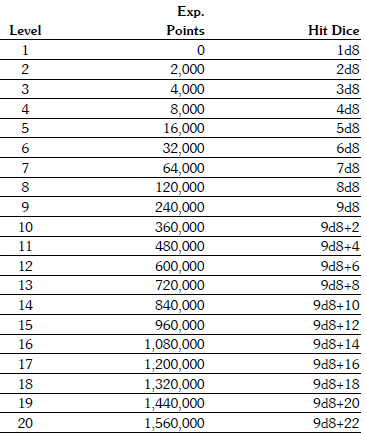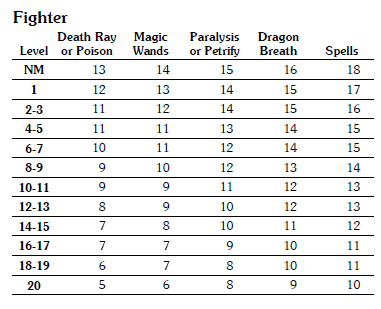Advancement
A fighter with enough money may build himself a home, even a castle, before he reaches 9th experience level. However, this home has no official sanction; even if it is a castle, the character is not a ruler or a nobleman.
When a fighter reaches Name level (9th level), the character is, owing to his great abilities and reputation, addressed as Lord (if male) or Lady (if female). This is status within his community even if it is not a formal title; it is for the DM to decide whether or not it is a formal title bestowed upon the fighter by the nation's rulers.
At Name level, the fighter will have to decide whether he intends to be a "land-owning fighter" (i.e., a ruler in his own right, and lord of a region of land) or a "traveling fighter" (one who may own homes but not rule land, and has no especially strong responsibilities to the nation's rulers). Don't be confused by these names. A land-owning fighter may spend a lot of time traveling and adventuring, and a traveling fighter may spend a lot of his time at home.
Land-Owning Fighters
There are two ways for a fighter to become a land-owning fighter: independently or in fealty to a greater ruler. The DM decides on what sort of government is used in his campaign. Assuming that it's based on medieval Europe, as is the case with many D&D game campaigns, a nation's government consists in part of a king and queen ruling a strong court of dukes, counts and barons, each of whom rules a smaller territory or fiefdom.
In order to become a ruler within an existing country, he will have to petition the country's rulers for a grant of land. If he has already done them great services in the past, they may give it to him immediately and gratefully, but if he is not already their friend or ally, they may send him on a difficult quest so that he can prove himself to them. Once he has been granted the land, he may build his castle upon it (at his own expense). The land may be occupied or not; if it is unoccupied, the prospective ruler had best try to lure settlers there soon, so that his dominion will begin receiving tax revenues.
At the very least, a land-owning fighter within an existing country will be granted the title of Baron (if male) or Baroness (if female), or the equivalent. If he continues to expand his land within the nation's laws and to make his dominion an increasingly strong and rich one, he may receive greater titles, such as Count/Countess and Duke /Duchess.
If the fighter wishes to make his dominion in a wilderness which is not within an existing country, he may call himself anything he wants— baron, duke, king, emperor. However, be aware that a too-glorious title will make others laugh at him. If he takes a title, it should be appropriate to the size and strength of the dominion he is ruling; he may wish to change his title as it increases in size and prosperity.
Traveling Fighters
If, at 9th level, a fighter does not decide to make a dominion for himself, he chooses to become a traveling fighter (you can use the term even if he really doesn't do a lot of traveling). Traveling fighters don't usually have the political power that land-owning fighters do, but they can receive special abilities to help compensate for that. (Note that we said can. They don't receive these abilities automatically.)
The alignment of a traveling fighter determines special abilities and other characteristics.
ADVANCED
KNIGHT: A Neutral traveling fighter may become a
KNIGHT. To gain knighthood, a fighter must swear fealty to a prince, king, or emperor. In return, the ruler will declare the character a knight; that ruler then becomes the knight's "liege." In most campaigns, knights are the most common sort of traveling fighters. The following rules apply to knights:
- If summoned by his liege the knight must report to him as quickly as possible, and must serve as the liege orders.
- If the knight ever refuses to obey the liege, or ever swears fealty to any other liege, the knight loses three levels of experience. (The DM may increase this penalty if the offense warrants it.) The previous liege may even order the offender slain for his treachery. In addition, rumors and tales of the "traitorous knight" may haunt the character forever after; the character may find it difficult to find help in places where his reputation is known.
If his liege dies, the knight is free to choose another. Additional benefits (lands, money, etc.) may be awarded to knights who swear fealty to the successor of a liege who dies. A knight may petition the liege for a peaceful end to his oath; however rarely granted. The knight would be banished, at the least, and could be stripped of all possessions as well.
- A knight may visit any castle, of any territory, and request sanctuary. The castle owner must, by the customs of the land, give the knight a place to stay for up to three days,
along with food and drink. He does not have to be friendly to the knight, but, according to this custom, may not challenge, attack, or refuse sanctuary to the knight. (Note that the knight cannot challenge or attack his host or members of his host's court or family, either. Should he do so, his sanctuary is at an end, and his host is now free to punish him.) In campaigns modeled after medieval Europe, this custom is nearly universal, but the DM is free to indicate that the custom is not present if his nations are not similar to Europe's.
- If a call to arms sounds (a call for knights to battle for justice), the knight must respond. This declaration can only be issued by the ruler of a large town (Mayor) or territory (Archduke or greater status), and the knight need only respond if it sounds in the area through which he is passing or if it is called by his liege. When the call to arms sounds, the knight must immediately travel as fast as possible to the ruling castle of the one who made the call to arms, and fight as ordered by the ruler—within the constraints of any knightly oaths he took in the course of the campaign. (If the ruler who made the call to arms orders him to kill innocents or helpless prisoners, the knight may choose to refuse, but he will make an enemy of that ruler.) The knight is entitled to compensation for this service; the ruler issuing the call to arms must grant the knight a gift appropriate to the value of the knight's services. (Many rulers will offer the gift out of gratitude; some will not. The knight has the right to demand the gift; he does not have to demand it if he does not wish to.)
There are two notable exceptions to the custom of the call to arms. In lands where the civilization is very different from medieval Europe, this custom might not be used (in wilderness areas where there are no rulers, it would naturally be unknown). If the knight is within a territory that has declared itself hostile to the knight's liege, the knight need not respond—if the call to arms is against the land of his liege, he must not respond. In fact, the knight would be in great danger when the call to arms sounds.






